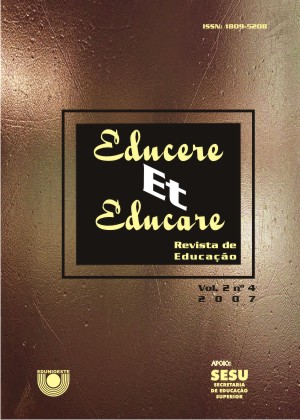REPRESENTAÇÕES SOCIAIS DE PROFESSORES SOBRE O FRACASSO ESCOLAR
DOI:
https://doi.org/10.17648/educare.v2i4.1665Palavras-chave:
Representações Sociais, Fracasso Escolar, Psicologia da Educação, Psicologia Social, AprendizagemResumo
O objetivo desse texto é o de analisar criticamente as representações sociais de professores sobre o fracasso escolar. Com base em dados provenientes de pesquisa empírica, o trabalho destaca que, embora os professores apresentem um discurso mais contextualizado que incorpora certos elementos de crítica, prevalece a culpabilização dos alunos, e ainda não se observa uma postura consciente de seu papel na produção do fracasso e nem um efetivo comprometimento no desenvolvimento de ações que possam levar à sua reversão. Desse modo, observa-se uma coerência ideológica entre as explicações patologizantes fornecidas pela Psicologia, que contribuem para diferentes formas de exclusão dos que “não aprendem” e as representações dos professores sobre o fracasso escolar como se este fosse um fenômeno individual, com pouca ou nenhuma conexão com os contextos sociais e educacionais. O trabalho indica a necessidade de profundas transformações na realidade educacional, especialmente no que se refere a formação docente, visto que a representação do fracasso escolar como produto de problemas individuais é uma das expressões da penetração da estrutura alienada da vida cotidiana no âmbito da educação.Downloads
Publicado
01-01-2000
Como Citar
ZONTA, C.; MEIRA, M. E. M. REPRESENTAÇÕES SOCIAIS DE PROFESSORES SOBRE O FRACASSO ESCOLAR. Educere et Educare, [S. l.], v. 2, n. 4, p. p. 205–217, 2000. DOI: 10.17648/educare.v2i4.1665. Disponível em: https://e-revista.unioeste.br/index.php/educereeteducare/article/view/1665. Acesso em: 15 fev. 2026.
Edição
Seção
Núcleo Temático: Aprendizagem e Ação Docente
Licença
Aviso de Direito Autoral Creative Commons
Política para Periódicos de Acesso Livre
Autores que publicam nesta revista concordam com os seguintes termos:
1. Autores mantém os direitos autorais e concedem à revista o direito de primeira publicação, com o trabalho simultaneamente licenciado sob a Licença Creative Commons Attribution que permite o compartilhamento do trabalho com reconhecimento da autoria e publicação inicial nesta revista.2. Autores têm autorização para assumir contratos adicionais separadamente, para distribuição não-exclusiva da versão do trabalho publicada nesta revista (ex.: publicar em repositório institucional ou como capítulo de livro), com reconhecimento de autoria e publicação inicial nesta revista.
3. Autores têm permissão e são estimulados a publicar e distribuir seu trabalho online (ex.: em repositórios institucionais ou na sua página pessoal) a qualquer ponto antes ou durante o processo editorial, já que isso pode gerar alterações produtivas, bem como aumentar o impacto e a citação do trabalho publicado (Veja O Efeito do Acesso Livre).
Licença Creative Commons
Esta obra está licenciada com uma Licença Creative Commons Atribuição-NãoComercial-CompartilhaIgual 4.0 Internacional, o que permite compartilhar, copiar, distribuir, exibir, reproduzir, a totalidade ou partes desde que não tenha objetivo comercial e sejam citados os autores e a fonte.


